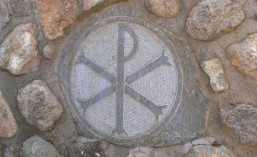The Russian punk band Pussy Riot rushed onto the solea* of Cathedral of Christ the Savior in Moscow and disrupted services by singing a ‘prayer’ for the removal of Valdimir Putin from office. They were then arrested and sentenced to two years in prison for hooliganism and blasphemy. Western artists and activists want to defend the three women members of the band in the name of free speech and artistic expression, but I think this avoids addressing a more complex situation. Whether the punishment fits the crime, and whether the ‘crime’ being punished is trespassing or offending Vladimir Putin only confuse matters further.
I believe this situation is more complex that the popular media reports, both in terms of the act committed, and how it needs to be evaluated. If nothing else, Russian law is not predicated on American ideals. There are at least four issues needing further exploration before clarity can be found:
- Freedom and Authority
- Church/State relationships
- Sacred space (sacramentality)
- The justice of God
All governments place limits on citizen behavior, though cultures differ on how important civil liberties are in relation to order and conformity. While some people in the United States don’t think breaking into churches and singing protest songs is a big deal, we are very harsh on people who rush into theaters and yell ‘Fire!’. Even in our country, free speech and artistic expression have limits; and ‘greater good’ does not justify breaking the law. In the West, we assume a ‘separation of Church and State’, however inconsistently this is applied. This is not a ‘given’ in Russia or other parts of the world. I personally tend to agree with Vladimir Putin that the experiment of separation of Church and State has been a failure (but that is another discussion). Russia, before the revolution, and presently, at some level sees the Church providing a broad foundation for all values, personal and social. The Church guides the government in making moral decisions, and the State helps the Church. This thinking is classic Orthodox theology coming out of Roman (Byzantine) Empire. While good in theory, history has not always been so kind to the Church in practice; rather than the world becoming like the Kingdom, often the Church takes on the habits of the world. If we understand the Church to be the “New Israel”, and we know our Old Testament history, this should not be a surprise to us.
It is difficult for us in the West to understand the concept of ‘sacred space’, as it is and was experienced in more sacramental cultures. In a materialistic society, all space is said to be uniformly the same. Spirituality (when acknowledged), is considered something personal and internal, not connected to particular places or objects. The Ground Zero Memorial in New York is the closest we have to the burning bushes, Mt Siani or Jerusalem, where the boundary between this world and ‘the other’ becomes thin. Elton John can rent out St John the Divine Cathedral in New York for a birthday bash, use the altar for a stage, and hardly anyone has a second thought. For pious Orthodox, the altar is a very special place like the Holy of Holies of the Old Testament Temple. This is where the bread and wine become the body and blood of Christ; the kingdom becomes present on earth. In the Orthodox Church, only priests, and those with a special blessing are allowed in the altar area, and the whole church around the altar is to be treated with a special reverence.
If the first three issues set the context, it is the justice of God that is the critical question; and it is here that I think the Church has failed; not just the Patriarchate of Moscow for what was said and done, but all the others that remained silent. The history of God’s justice is the history of healing, and is tied to the bigger issue of new creation. God’s treatment of Israel, the Church and the creation is one of seeking forgiveness and embrace, not anger and separation. It is appropriate to constrain evil, and actions have consequences; but the response-ability of the Church is to see these as opportunities for love and healing, not righteous indignation and vendetta. If the quotes of a young Russian are correct, these are not the words we should have heard from the Russian Church. In my opinion, the Russian Church and State are working too closely to achieve earthly political ends, and missed an opportunity for a loving Christian response**. It is hard to see the Kingdom proclaimed by two years in prison. This sentence seems to be more of a vindictive political statement than an effort at reconciliation. If the crime was defacing the holiness of the Church, then maybe six weeks of scrubbing Church steps and some time helping the poor would be a better sentence.
There are two good in-depth writings on Pussy Riot which I would recommend:
Frederica Mathewes-Green writes from an Orthodox perspective, of what this violation of the sacred means to many worshipers. She also had an interesting interaction with a young Muskovite, who provides some interesting background.
Vadim Nikitin has some good insights from a political perspective.
*The solea is the space between where the people gather (sanctuary) and the altar. It is in front of the icon screen, where the people usually receive communion.
** I have written other blogs about my thoughts on blasphemy and how it should be treated, and will not repeat myself here.
